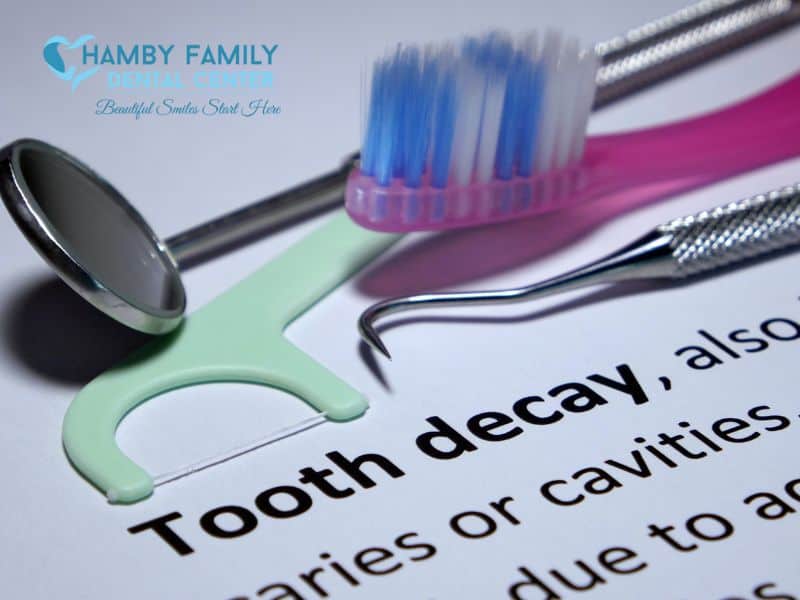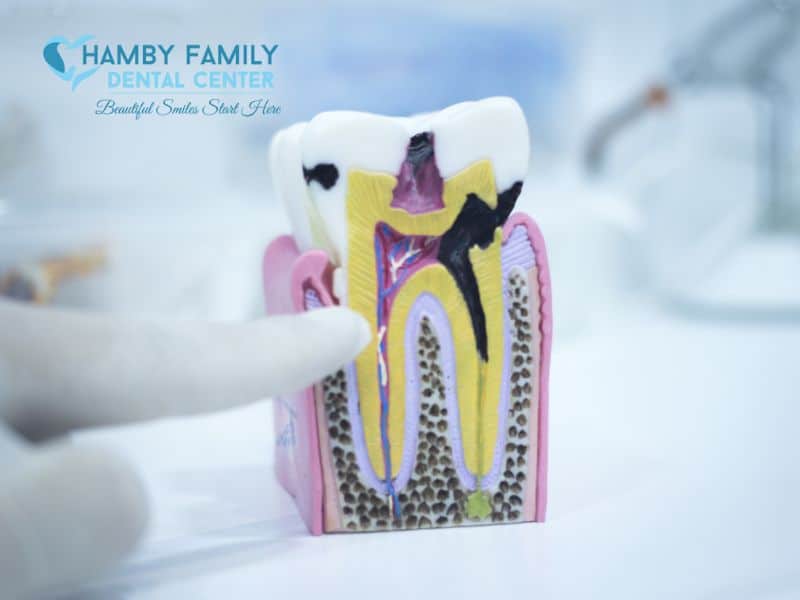Tooth Decay Prevention Methods
Home » Fuquay-Varina Dental Blog » Tooth Decay Prevention Methods
Tooth Decay and How to Prevent It

The early stages of tooth decay can be treated; however, once tooth decay is serious, the care is non-preventive. Fillings, crowns, root canals, and extractions become the solutions to teeth that are in the advanced stages of decay. It is much less costly to use tooth decay prevention methods to circumvent the need for these serious measures. Early detection of the problem is key to salvaging a tooth.
The best course of action is to prevent tooth decay from occurring. Though tooth decay is common, it is easily preventable. The proper care to maintain a healthy mouth and one that is free of oral disease is in your control. At your Fuquay-Varina dentist, our team of professional dental experts can help you with a care routine that prevents tooth decay with regular dental exams and self-care at home. In this article are some tips for you to follow in preventing tooth decay.
Tooth Decay

Tooth decay is the destruction of tooth structure and can affect both the enamel and the dentin layer of the tooth. Decay occurs when foods containing carbohydrates such as bread, cereals, milk, soda, fruits, cakes, or candy are left on the teeth. Bacteria that live in the mouth digest these foods and turn them into acids. The bacteria, acid, food debris, and saliva combine to form plaque that clings to the teeth. The acids in plaque dissolve the enamel surface of the teeth and create holes called cavities.
Using Fluoride
Using products that contain fluoride is essential in preventing tooth decay. Fluoride is a mineral that can reverse or even stop early tooth decay. It prevents mineral loss in tooth enamel and replaces lost minerals and it reduces the ability of bacteria to make acid.
Ways to get fluoride include:
- Drinking fluoride water from a community water supply
- Brushing with a fluoride toothpaste
- The dentist may recommend more fluoride–by applying a fluoride gel or varnish to tooth surfaces, prescribing fluoride tablets, recommending a fluoride mouth rinse
Maintaining Good Oral Hygiene
Your oral hygiene routine goes a long way in preventing tooth decay. This includes brushing, using mouthwash, eating a healthy diet, and getting regular dental checkups. Additionally, you can reduce bad habits that cause tooth decay.
Brushing Your Teeth
- You should brush your teeth two times each day, once in the morning and again at bedtime, using fluoride toothpaste.
- Brush within at least 30 minutes of eating a meal, especially if it is rich in sugar and carbohydrates.
- Cover all surfaces of the teeth when you brush.
- Mouth rinsing after brushing is discouraged because it washes away the fluoride from the toothpaste. Spit out the excess paste instead.
- Regularly replace your toothbrush–every two to three months is suggested. As the toothbrush wears out, it becomes less effective.
Flossing Once a Day
Clean between your teeth daily with dental floss or interdental cleaners. Flossing removes plaque and food particles from between teeth and below the gum line where a toothbrush can’t reach. It is the second step in a two-step process of brushing and flossing to completely remove remnants of food that will form plaque and ultimately lead to tooth decay.
Using Mouthwash
Dental mouthwashes, especially ones that contain fluoride, also help prevent tooth decay. Some rinses have antiseptic ingredients that help kill bacteria. The American Dental Association (ADA) says you can use mouthwash before or after brushing based on your preference. However, to be on the safe side, you may want to wait around 20 minutes after brushing to use an oral rinse so as not to rinse away the fluoride left in your mouth by toothpaste.

Eating Nutritious and Balanced Meals – Limiting Sugar
Eating a nutritious diet and balanced meals will help to prevent tooth decay. Consumption of foods and drinks containing sugar can accelerate tooth decay. Avoid eating unhealthy snacks between meals to decrease the amount of sugar that adheres to your teeth. Chewing sugar-free gum after a meal can help your mouth produce more saliva, which cancels out any acids that have formed
Using a Dental Sealant
Dental sealants are another good way to help avoid a cavity. Sealants are thin, plastic coatings painted on the chewing surfaces of the back teeth (molars). Sealants help protect the rough and uneven surfaces of molars where a toothbrush can’t brush them away easily. Food and bacteria can get stuck in the pits and grooves of molars and remain there for a long time. Using a sealant will protect the back teeth in children and adolescents where most cavities occur.
Getting Routine Dental Exams and Checkups
Routine dental checkups are a vital part of a good oral hygiene regimen. Dental checkups are recommended twice a year. Your dental team can help you manage your and your family’s oral health and help you prevent tooth decay.
The Fuquay-Varina dentist and the team at Hamby Family Dental Center can find tooth decay in the early stages and treat it before the decay has a chance to worsen. We can provide information to help you care for your mouth at home by demonstrating correct cleaning techniques, advising you on products that address your needs, and providing guidance about how your diet and lifestyle may be affecting your oral health.
Contact Hamby Family Dental Center to Schedule a Dental Checkup
Our professional dental team at Hamby Family Dental Center can guide you in keeping a healthy oral hygiene routine and recommend possible solutions for preventing tooth decay. Contact us today by calling us at 919-552-2431 or completing the form below.
Appointment Request
Appointment Request
